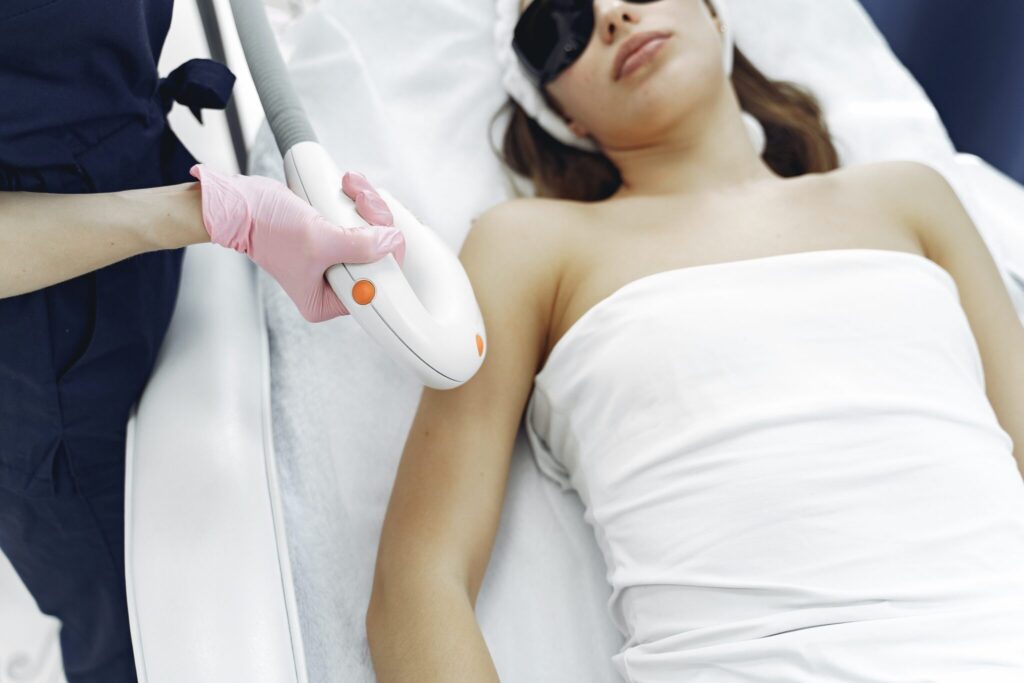
Laser hair removal allows you to get rid of hair on the skin for a long time. But there are many questions about the principle of the laser, the effect of radiation on the internal organs, when it is best to start, and what are the contraindications.
How does laser hair removal work?
Laser hair removal is a method of radical hair removal with the destruction of hair follicles with the help of laser radiation.
During laser hair removal, the melanin absorbs a flash of light. Light is converted into heat and heats the hair follicle. As a result, the blood in the capillaries that feed the hair follicle coagulates, the hair bulb does not receive nutrition, dies, and falls out.
The course of laser hair removal consists of 8-12 procedures. After that, you need to do maintenance procedures once a year or half a year, when the hair appears.
What kind of laser is more efficient?
The most common lasers are diode and alexandrite.
The efficiency and safety of both lasers are the same. It depends on the correctly selected parameters of the devices, hair type, and skin type of the patient.
Diode laser is suitable for all patients with stiff dark hair; alexandrite laser has the best effect on 1-3 phototypes according to Fitzpatrick (very light skin, often with freckles, ivory, or dark skin), its advantage is the effect on dark fluffy hair.
Due to alexandrite laser hair removal, the skin becomes smooth immediately after the session. With diode laser hair falls out within 10-14 days.
Important: laser light does not remove light, red and gray hair, because it does not contain the pigment melanin.
Does laser light affect other parts of the body?
Laser hair removal is considered a completely safe procedure. The radiation affects only the pigment melanin and acts on the hair follicle without affecting or damaging the surrounding tissues.
Laser light does not affect the reproductive organs and does not cause skin diseases.
The laser does not cause complications on the skin if it is handled by a qualified specialist who has set the parameters correctly, and the patient clearly follows all the recommendations.
Why does laser hair removing can cause pain?
Because many nerve endings are located on human skin, minor pain may occur when exposed to laser light.
Do you need to take tests before laser hair removal?
You do not need to visit a doctor or take tests before the procedure.
The specialist who performs laser hair removal should collect initial data about the patient:
- ask about the predisposition to burns,
- chronic diseases,
- taking medications.
If according to the questionnaire, everything is fine with the patient, laser hair removal can be performed without additional research.
When is the best to start laser hair removal?
Laser hair removal can be started at any time of the year if you follow the recommendations.
You should not sunbathe two weeks before the procedure and two weeks after, because after hair removal the skin becomes more sensitive to UV radiation.
If you plan to be in the active sun or go to the sea, where you are going to sunbathe, it is better not to start in the summer.
Important: laser hair removal can be performed only for adults.
How to prepare for the procedure?
What to avoid 2 weeks before the procedure:
- use auto-tanning;
- visit the solarium;
- use antibiotics, retinoids, diuretics, and nonsteroidal anti-inflammatory medicine.
For two to four weeks, you can not remove hair with wax, sugaring or tweezers, so as not to damage the hair follicle. Allows the only shaver.
If you are going to epilate your face, you should not use products containing alcohol, acids, and retinol for three to five days before the procedure.
What to do after your epilation?
- For two or three days after the procedure, you need to use regenerating agents to restore the skin;
- For 3-7 days avoid a hot bath, shower, sauna, swimming pool, gym;
- Do not sunbathe, do not visit the solarium, and do not use auto-tanning for two weeks;
- Do use at least SPF 50 sunscreen with Zinc for at least 2 weeks.
There are absolute and relative contraindications to laser hair removal
Absolute contraindications:
- diabetes in a state of decompensation;
- epilepsy;
- oncological diseases;
- systemic blood diseases;
- infectious skin diseases;
- tattoos (in the area of epilation);
- pregnancy.
Relative contraindications:
- lactation period;
- use of certain medications: antibiotics, nonsteroidal anti-inflammatory, retinoids, diuretics;
- herpes in the active stage.
Picture Credit: Pexels
